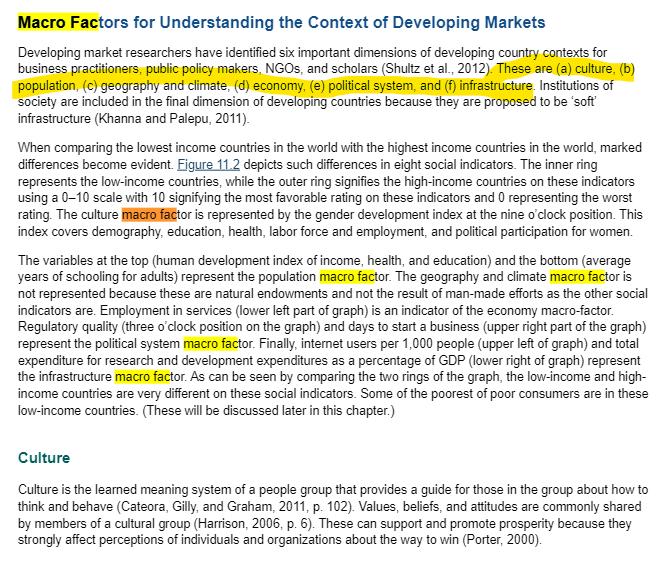Answered step by step
Verified Expert Solution
Question
1 Approved Answer
Which of the six macro factors do you believe is the most critical to achieving an improved quality of life for citizens of developing countries
Which of the six macro factors do you believe is the most critical to achieving an improved quality of life for citizens of developing countries and why?

Macro Factors for Understanding the Context of Developing Markets Developing market researchers have identified six important dimensions of developing country contexts for business practitioners, public policy makers, NGOs, and scholars (Shultz et al., 2012). These are (a) culture. (b) population, (c) geography and climate, (d) economy, (e) political system, and (f) infrastructure. Institutions of society are included in the final dimension of developing countries because they are proposed to be 'soft' infrastructure (Khanna and Palepu, 2011). When comparing the lowest income countries in the world with the highest income countries in the world, marked differences become evident. Figure 11.2 depicts such differences in eight social indicators. The inner ring represents the low-income countries, while the outer ring signifies the high-income countries on these indicators using a 0-10 scale with 10 signifying the most favorable rating on these indicators and 0 representing the worst rating. The culture macro factor is represented by the gender development index at the nine o'clock position. This index covers demography, education, health, labor force and employment, and political participation for women. The variables at the top (human development index of income, health, and education) and the bottom (average years of schooling for adults) represent the population macro factor. The geography and climate macro factor is not represented because these are natural endowments and not the result of man-made efforts as the other social indicators are. Employment in services (lower left part of graph) is an indicator of the economy macro-factor. Regulatory quality (three o'clock position on the graph) and days to start a business (upper right part of the graph) represent the political system macro factor. Finally, internet users per 1,000 people (upper left of graph) and total expenditure for research and development expenditures as a percentage of GDP (lower right of graph) represent the infrastructure macro factor. As can be seen by comparing the two rings of the graph, the low-income and high- income countries are very different on these social indicators. Some of the poorest of poor consumers are in these low-income countries. (These will be discussed later in this chapter.) Culture Culture is the learned meaning system of a people group that provides a guide for those in the group about how to think and behave (Cateora, Gilly, and Graham, 2011, p. 102). Values, beliefs, and attitudes are commonly shared by members of a cultural group (Harrison, 2006, p. 6). These can support and promote prosperity because they strongly affect perceptions of individuals and organizations about the way to win (Porter, 2000).
Step by Step Solution
There are 3 Steps involved in it
Step: 1

Get Instant Access to Expert-Tailored Solutions
See step-by-step solutions with expert insights and AI powered tools for academic success
Step: 2

Step: 3

Ace Your Homework with AI
Get the answers you need in no time with our AI-driven, step-by-step assistance
Get Started


